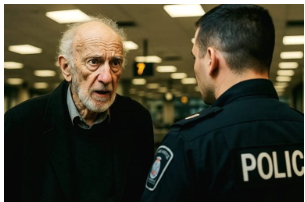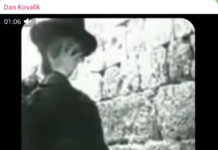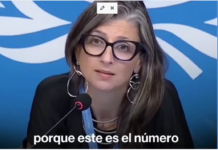Original Link Here: The Interrogation of Richard Falk: When Speaking Truth Becomes a “National Security Threat” – Global ResearchGlobal Research – Centre for Research on Globalization
Author’s Note: I wrote this essay to show what really happened when Richard Falk and Hilal Elver were detained at the Canadian border — and to explore what it reveals about power, accountability, and the fight to speak truth to authority.
Introduction: Two Scholars Detained, A Truth Confronted
Richard Falk has spent the better part of a century inside the world’s most serious rooms: the United Nations, the International Court of Justice, the international legal tribunals where the language of war, occupation, and human rights is hammered into shape.
At 95, he carries his papers in neat folders and moves with the slow care of a man who has spent a lifetime thinking rather than rushing. His partner, Hilal Elver — a distinguished scholar and former UN Special Rapporteur on the Right to Food — is no more threatening than he is.
Yet when they stepped off their flight at Toronto Pearson Airport, on their way to Ottawa to speak about Gaza, they were taken aside, escorted down a narrow hallway, and placed in a brightly lit secondary inspection room.
The border agents told them they had been detained because they posed a “national security threat to Canada.”
Even as the Tribunal they were heading to in Ottawa gathered evidence and testimony, the state sought to preempt its impact at the very border. What followed was an interrogation of Falk and Elver that revealed a troubling conflation of Canada’s national security with ideological alignment to Israel.
The questions came one after another, circling obsessively around the same forbidden center:
“What exactly will you be saying about Israel in Ottawa?”
“Why did your UN reports criticize Israeli military actions?”
“Have you been in contact with Palestinian organizations?”
“What is your position on the war in Gaza?”
“Who invited you to this Tribunal, and why?”
The line of questioning was so singularly focused on defending Israeli policy that it betrayed a fundamental confusion of national interests. The agents wanted nothing about Canada — not a single question about contraband, immigration status, visas, residency, or criminal history.
Everything was about Israel.
Halfway through the four-hour ordeal, the absurdity sharpened into recognition: nothing Falk or Elver had ever written posed any threat to Canada. But everything they had documented about Israeli conduct — settlement expansion, blockade, collective punishment, starvation — posed a threat to Israel’s political security, and therefore, in the logic that now governs Canadian institutions, to Canada itself.
In that moment, the interrogation ceased to be absurd.
It became coherent — chillingly so.
Canada had collapsed the boundary between its own national security and Israel’s political narrative — the border itself enforcing it.
This transformation did not happen overnight. It is the product of a political logic constructed over decades.
How Political Loyalty Becomes a Matter of National Security
First, criticism of Israel has been steadily recast as a security issue, rather than a political disagreement. Organizations such as CIJA, B’nai Brith, and the Friends of Simon Wiesenthal Center — which explicitly identify as Jewish and advocate for the preservation of Israel as an apartheid Jewish state — have spent years briefing Canadian politicians, police, and security agencies with the claim that Palestinian solidarity, criticism of Israeli occupation, or support for boycotts constitutes “extremism” or “potential radicalization.”
These same zionist organizations have shaped Canadian security discourse in ways that conflate Palestinian advocacy with extremism.
Second, Canadian governments have elevated support for Israel from a diplomatic position to a pillar of national identity. Israel is framed as a frontline state in the “war on terror,” a democratic ally in a dangerous world. Once foreign policy is securitized (treated as a national security matter), ordinary political disagreements — like criticizing Israeli policies — are portrayed as destabilizing or threatening to Canada itself, even when they clearly pose no real risk.
Third, Canadian institutions increasingly outsource their concept of “risk” to these advocacy groups. They monitor their cues, amplify their alarms, and follow their frame.
This posture is rooted in a complex blend of geopolitical alignment, domestic political calculations, and a shared settler-colonial history that makes Canada’s political establishment uniquely sensitive to challenges of Israel’s legitimacy.
We have seen this pattern before. The same choreography that silenced a local activist in Vancouver was now being deployed at the national border against a former UN official. The system, it seems, operates the same way whether the target is a grassroots organizer or an international jurist.
Charlotte Kates: A Domestic Parallel
When Vancouver activist Charlotte Kates praised Palestinian resistance at a rally in 2024, nothing happened immediately. Police did not arrest her, prosecutors did not open a file.
But within hours, B’nai Brith had clipped her speech, declared it a threat, and demanded action. CIJA echoed the alarm. Only then did the Vancouver Police launch a hate-crime investigation, followed by bail conditions barring Kates from attending any rallies at all — a remarkable prior restraint in a country that claims to champion free expression.
The sequence was unmistakable:
- these Jewish lobby groups declare a threat
- political pressure mounts
- security apparatus activates
This is the same choreography that surrounded Falk for over a decade. When he served as UN Special Rapporteur, his reports documenting Israeli violations sparked coordinated denunciations from the same advocacy networks. They repeatedly urged the Canadian government to isolate him, discredit him, or keep him out entirely.
So when Falk arrived in Canada to speak at a Tribunal these groups had already condemned, the border system reacted exactly as it had been trained: it treated him, not as an elderly scholar with a folder of notes, but as an ideological hazard.
The Tribunal: What It Sought, What It Found, Why It Matters
The Ottawa Tribunal on Canadian Responsibility — the event Falk and Elver were traveling to — was a hybrid people’s tribunal, legal inquiry, and moral intervention. Held at the University of Ottawa’s Human Rights Research and Education Centre, it brought together over fifty witnesses: survivors from Gaza, Palestinian legal scholars, Indigenous leaders, international jurists, and Canadian lawyers working on arms exports and sanctions obligations.
The Tribunal stands squarely in the lineage of historic people’s tribunals, translating past lessons into direct scrutiny of Canada’s policies. Its task was explicit: to examine how Canada enables the destruction of Gaza.
Survivors described starvation, displacement, and the annihilation of communities. Experts traced Canadian-made components in Israeli drones and jets. Lawyers detailed Canada’s obligations under the Genocide Convention and its failures to meet them. Indigenous speakers drew parallels between Canada’s own settler-colonial foundations and Israel’s occupation.
Falk articulated the legal framework of third-state responsibility — the duty of one country not to assist in genocide in another. Elver presented evidence of starvation used as a weapon, a clear violation of international humanitarian law.
The Tribunal’s final judgment is still forthcoming. But the record it has produced is already significant: a structured, public, internationally connected archive of Canadian complicity.
And it raises the question that haunts every people’s tribunal:
Do these efforts matter? Or are they symbolic gestures swallowed by the indifference of power?
History answers decisively.
The Legacy of People’s Tribunals
People’s tribunals have long served as moral vanguards ahead of official recognition.
The Russell Tribunal on Vietnam reframed U.S. actions as war crimes — long before mainstream institutions dared to.
The Russell Tribunal on Palestine declared Israeli apartheid in 2011 — ten years before Human Rights Watch and Amnesty International adopted the same framework.
The Tokyo Women’s Tribunal established sexual slavery as a crime against humanity, shaping UN reports and national reparations debates.
The International Monsanto Tribunal influenced the UN’s consideration of ecocide.
The World Tribunal on Iraq created a powerful, lasting historical record that shaped global public opinion.
These tribunals lacked formal authority. But they changed the language, categories, and evidence base through which justice would later be pursued. The Ottawa Tribunal is cut from that lineage.
The Impact of This Tribunal
The Tribunal produced:
- survivor testimony that cannot be erased,
- legal analysis that will echo in courtrooms and UN submissions,
- a public record of Canadian complicity,
- and an international conversation amplified — ironically — by the state’s attempt to suppress it.
Most Canadians would never have heard of the Tribunal without Falk and Elver’s detention. What the border tried to silence became national news. Their detention provoked a chorus of condemnation that echoed the Tribunal’s own purpose: Canadian Senator Yuen Pau Woo called it “appalling,” Azeezah Kanji called it “outrageous,” and British sociologist Martin Shaw described it as “an extraordinary development in the global repression of the Palestinian cause.” Falk himself identified the core motive: a system designed to “punish those who endeavor to tell the truth.”
The Tribunal cannot stop the bombs over Gaza, but it can stop the silence that makes them possible. It lays the groundwork for future accountability, shifts the moral terrain beneath political actors who rely on public ignorance, and ensures that when the history of Gaza is written, Canada’s role will not be omitted.
But truth does not end with tribunals. What can the average person do in the face of such entrenched power? Not everything — but not nothing. They can refuse the silence that the security-state narrative depends on. They can circulate tribunal testimony, challenge the framing of Palestinian advocacy as extremism, and create spaces — in classrooms, unions, community centers, faith circles, and media — where Canada’s role can no longer hide behind rhetoric. They can support legal efforts pursuing accountability and organizations that monitor the expanding reach of border and security agencies.
They cannot force the state to reveal its operations — but they can make secrecy costly. Falk himself could not prevent his detention, but public outrage ensured the attempt at silencing became a public confession. This is the leverage ordinary people retain: the ability to expose the system’s logic and make complicity visible.
The border could detain Falk, but not his message. It could hold two scholars for hours, but it could not hold back the truth they carried. And it cannot halt the reckoning that emerges when testimony, law, and collective conscience refuse to be dismissed as a “security threat.”
Conclusion: The Real Threat
What happened to Richard Falk and Hilal Elver in that small border room was not a bureaucratic accident. It was a political act. It revealed a system in which dissent about Israel is treated as a security threat, where Palestinian advocacy is pathologized, and where scrutiny of Canada’s own responsibilities is met with hostility.
But the threat they posed was never to Canada.
It was to complacency.
To hypocrisy.
To the comfort of not knowing.
To the political immunity that protects powerful states from accountability.
In the end, the greatest threat to power is not two distinguished scholars. It is the truth they carry — and the courage of those willing to hear it. The border could hold them for hours, but it could not contain the reckoning their testimony will demand — or the truth that ordinary people can no longer ignore.
*
READ MORE:
Click the share button below to email/forward this article. Follow us on Instagram and X and subscribe to our Telegram Channel. Feel free to repost Global Research articles with proper attribution.
Rima Najjar is a Palestinian whose father’s side of the family comes from the forcibly depopulated village of Lifta on the western outskirts of Jerusalem and whose mother’s side of the family is from Ijzim, south of Haifa. She is an activist, researcher, and retired professor of English literature, Al-Quds University, occupied West Bank. Visit the author’s blog.
She is a Research Associate of the Centre for Research on Globalization (CRG).
Featured image is from the author
Global Research is a reader-funded media. We do not accept any funding from corporations or governments. Help us stay afloat. Click the image below to make a one-time or recurring donation.

















